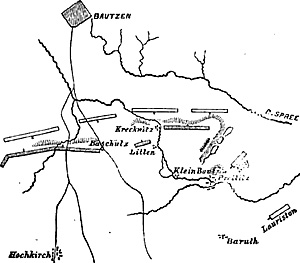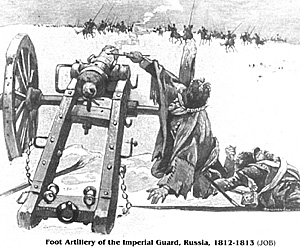
At Bautzen, three weeks after the battle we have just described, Napoleon again found himself opposed to the allied Russians and Prussians, and was to learn at the hands of his opponents the effect which guns skilfully placed in position may produce.
On the second day of the battle (the 21st of May) Napoleon, while with the bulk of his army he assailed the Centre and left of his foes, directed Ney to turn and surround their right, his orders being to move on the steeple of Hochkirch, so as to get completely in rear of the enemy. Lauriston was also detached to move by Baruth in the same direction. Ney did succeed in capturing Freititz, a village quite in rear of the Allied position, but Blucher being determined to retake it sent twenty Prussian guns to play on the flank of his dense columns.
The effect of these guns advantageously placed as they were, was such as to cause Ney to swerve from his true direction and establish himself on some heights near Klein Bautzen, from which his artillery could reply on more equal terms to that of the enemy. The village of Preititz had also to be abandoned, and before Ney could again advance he had to wait two hours for his reserves to come up. The check thus brought about probably saved the allied army from total destruction, for the delay and vaccillation of Ney enabled its leaders to take measures to ward off his menace, coming as it did from an unexpected quarter, and to prepare for a general retreat.
 When Ney did eventually resume his attack the golden opportunity for decisive success had passed away, the chaussee through Hochkirch, in rear of the whole army of his opponents, could no longer be gained, and the day, which might have been crowned by a total rout, could only end in a victory.
When Ney did eventually resume his attack the golden opportunity for decisive success had passed away, the chaussee through Hochkirch, in rear of the whole army of his opponents, could no longer be gained, and the day, which might have been crowned by a total rout, could only end in a victory.
Jomini, [3] who was Ney's chief of the staff in this action, quotes this incident as an example of what the flanking fire of artillery is capable of accomplishing. From this same battle Taubert gives as an illustration of the power of guns to defend themselves, the conduct of a Prussian Horse Artillery battery (Zinken's), in beating off the attack made on it by a battalion of infantry, and so throwing it into confusion by its canister fire that it was compelled to lay down its arms.
More Achievements of Field Artillery Part II
Achievements of Field Artillery The Era of Napoleon: Part I
Back to Age of Napoleon 30 Table of Contents
Back to Age of Napoleon List of Issues
Back to MagWeb Master List of Magazines
© Copyright 1999 by Partizan Press.
This article appears in MagWeb (Magazine Web) on the Internet World Wide Web.
Other military history articles and gaming articles are available at http://www.magweb.com